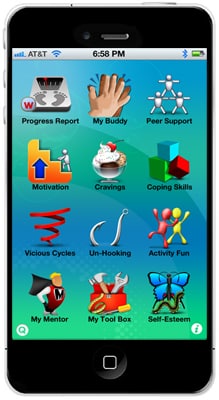The Advantages of a Mobile Application for Weight Loss

With co-author Suzette Glasner of the Geffen School of Medicine in Los Angeles, Dr. Robert Pretlow recently conducted a study on the effectiveness of a weight loss mobile phone application for teenage obesity.
The study involved 37 teens from ages 14-18 with a mean BMI of 38.1, meaning they were all considered obese. The teens were given the Brainweighve smartphone which asks them to first create a “Dread List” of stressful situations they face, then Action Plans for dealing with each dreaded situation without resorting to eating.
Displacement gone rogue
“Stress in childhood has been shown to predict weight problems,” the authors say in a peer-reviewed report on the study in the scientific journal, Eating and Weight Disorders. Stressful situations can cause “the brain’s displacement behavior mechanism going rogue,” resulting in a retreat to eating when confronted with stress. The authors wrote,
We further speculate that for such persons, the destructive displacement behavior may become their sole coping avenue.
The mobile app is used to short-circuit the displacement mechanism by offering alternatives to eating in moments of peak stress. Action Plans can be as simple as deep breathing, squeezing your hands together, or counting to 10. Even a small disruption of the displacement activity can lead to a successful outcome.
The mobile app is effective because teenagers usually have a phone with them at times of peak stress: in school, with friends, on outings, and at home. It is key to be able to call up an Action Plan at the moment of stress, not hours later. For example, if a teen smells burgers cooking at a nearby fast food restaurant, by opening the app and executing an action plan, they can often resist the signal to eat.
Self-directed success
Dr. Pretlow’s study showed that teens were very good at coming up with dreaded situations that often resulted in stress eating. They knew their triggers and had no problem sharing those with the app.
Subjects also picked their own Action Plans, matching up each “dread” with an action that did not include eating. Subjects report that Action Plans helped them ignore cues such as the presence of highly pleasurable foods. The authors state that more work needs to be done on managing reward cues, such as parties, celebrations, or achievements that often come with binge eating:
The strength of the current study lies in the remarkable ability of the majority of these young people to identify difficult situations and frustrations in their lives and create thoughtful and compelling action plans to deal with each one.
Drs. Prelow and Glasner have shown that a smartphone application is capable of short-circuiting the displacement mechanism when properly configured and used at the moment of peak stress. More studies are planned, but the current study holds out hope that teens can “curb their addiction without relying on willpower to not overeat.”
Your responses and feedback are welcome!
Image by Daria Nepriakhina/Unsplash

 Thirty (30) significantly overweight youth, age 10-21, in the Seattle area, are needed to participate in a study of a new smartphone app in a self-directed weight loss program. Participants must have a committed desire to lose weight. Participants will be lent an iPhone 4 for a four-months pilot study, to run early June through early October 2012.
Thirty (30) significantly overweight youth, age 10-21, in the Seattle area, are needed to participate in a study of a new smartphone app in a self-directed weight loss program. Participants must have a committed desire to lose weight. Participants will be lent an iPhone 4 for a four-months pilot study, to run early June through early October 2012. FAQs and Media Requests:
FAQs and Media Requests: 











